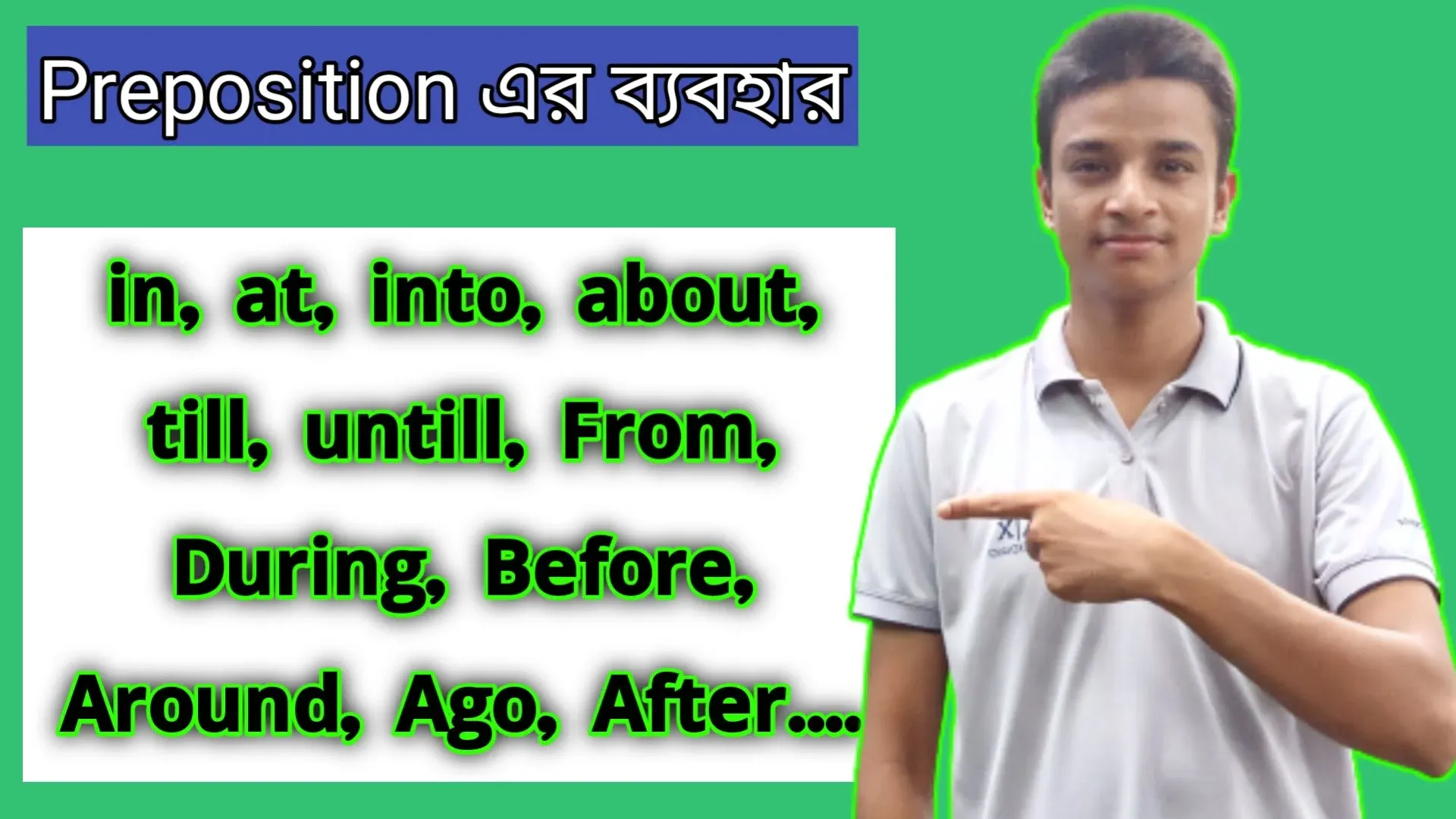Preposition এর ব্যবহার (সহজে প্রিপজিশন)

ইংরেজিতে দক্ষ হতে হলে Preposition এর ব্যবহার, নিয়মাবলী, অর্থ, অবস্থান, চেনার উপায় ইত্যাদি জানা অত্যন্ত জরুরি। প্রিপজিশন এর ব্যবহারের নিয়ম সম্পর্কে উদাহরণসহ নিচে বিস্তর বর্ণনা করা হয়েছে।
Preposition এর অর্থ
Pre ও Position দুটি শব্দের সমন্বয়ে গঠিত শব্দ হলো Preposition। Pre অর্থ হলো পূর্বে ও Position অর্থ হলো অবস্থান। ফলে অর্থ হয় পূর্বে অবস্থান।
Preposition এর অবস্থান
প্রিপজিশন মূলত শব্দের আগে অবস্থান করে নতুন অর্থ তৈরি করে। যা আমরা প্রিপজিশনের অর্থ অনুসারে বুঝতে পারি।
Preposition চেনার উপায়
প্রিপজিশন চেনার উপায় সম্পর্কে জানতে নিচের বাক্যটি লক্ষ্য করুন।
We are at home. - আমরা বাড়িতে আছি।
এখানে, at হলো একটি প্রিপজিশন। আমরা জানি, home অর্থ "বাড়ি"। home এর পূর্বে at যুক্ত হলে at home হয়। "at home" এর অর্থ দাঁড়ায় "বাড়িতে"।
এভাবেই Preposition শব্দের আগে অবস্থান করে নতুন অর্থ তৈরি করে। যা আমরা প্রিপজিশন হিসেবে চিনে থাকি।
Preposition এর নিয়মাবলী
At এবং in এর ব্যবহার
- স্থান: তুলনামূলক দুটি স্থানের মধ্যে বড় স্থানের পূর্বে in এবং ছোট স্থানের পূর্বে at বসে ।
যেমন: Aowlad lives at Galachipa in Patukhali. - আওলাদ পটুয়াখালীর গলাচিপায় বাস করে।
- সময়: ঘড়ির সময়, Night, noon, dusk, dawn এর পূর্বে at বসে।
যেমন: Imran goes to school at 10 o'clock. - ইমরান ১০ টায় স্কুলে যায়।
I sleep at night every day. - আমি প্রতিদিন রাতে ঘুমাই।
Morning, evening, afternoon এর পূর্বে in বসে।
যেমন: Imran goes to school in the morning. - ইমরান সকালে স্কুলে যায়।
Note: সময়ের পূর্বে in ব্যবহার করলে তারপর the বসে। কিন্তু at ব্যবহার করলে the বসে না ।
At, in এবং on এর ব্যবহার
- দিন, মাস, বছর ও সময়: মাস বা বছরের পূর্বে in, দিন বা তারিখের পূর্বে on এবং নির্দিষ্ট সময়ের পূর্বে at বসে।
যেমন: I will meet him at 7 o'clock on Friday in August. - আমি তার সাথে আগস্টের শুক্রবার ৭টায় দেখা করবো।
Into এবং in এর ব্যবহার
- ভিতরে অবস্থান: কোন কিছুর ভিতরে অবস্থান বা স্থিতিশীলতা বুঝালে in বসে।
যেমন: The men are in the room. - মানুষগুলো রুমের ভিতরে।
- গতিশীল ও রূপান্তর: ভিতরে গতিশীল অবস্থায় প্রবেশ এবং রূপান্তর হওয়া বুঝালে into বসে।
যেমন: The men are entering into the room. - মানুষগুলো রুমের ভিতরে প্রবেশ করেছে। (গতিশীল)
যেমন: Water changes into ice. - পানি বরফে পরিবর্তন হয়। (রূপান্তর)
After ও in এর ব্যবহার
- ব্যাপক সময় (period of time): যদি অতীতকালে ব্যাপক সময় (period of time) বুঝায় তবে after ব্যবহৃত হয়। আর যদি ভবিষ্যৎকালে ব্যাপক সময় (period of time) বুঝায় তাহলে in ব্যবহৃত হয়ে থাকে।
যেমন: He returned to his village after ten months. - সে দশমাস পরে তার নিজ তার নিজ গ্রামে ফিরেছে।
Laborers will complete the work in two days. - শ্রমিকরা দুই দিনের মধ্যে কজটি সম্পন্ন করবে।
In এবং within এর ব্যবহার
ভবিষ্যৎকালে অনেক সময়ের শেষ মুহূর্ত বুঝালে in বসে আর যদি সেই সময় শেষ হওয়ার পূর্ব মুহূর্ত বুঝায় তাহলে within বসে।
যেমন: Mr. Kamal will come in a month. (একমাসের শেষ মুহূর্তে)
The workers will finish the work within a month. (একমাসের পূর্ব মুহূর্তে)
In, by ও before এর ব্যবহার
ভবিষ্যৎকালে ব্যাপক সময়ে বুঝালে In বসে এবং নির্দিষ্ট সময়ের পূর্বে বুঝালে by বা before বসে।
যেমন: They will have finished reading the book by/before 5 pm. (নির্দিষ্ট সময়)
He will come in a month. (ব্যাপক সময়)
In এবং after এর ব্যবহার
ভবিষ্যৎকালে in এবং অতীতকালে after ব্যবহৃত হয়।
যেমন: Tanisa's father will come from the United Arab Emirates in two weeks.
Our teacher died after three months.
From, since এবং for এর ব্যবহার
since বা from বসে কোন নির্দিষ্ট সময়ের পূর্বে এবং for বসে কোন ব্যাপক সময়ের পূর্বে।
যেমন: They have been reading since morning. - সকাল থেকে বৃষ্টি হচ্ছে।
They have been reading for three hours. - দুই ঘন্টা যাবত বৃষ্টি হচ্ছে।
Note: Since ও From অর্থ হলো "থেকে"। for অর্থ হলো " যাবত, পর্যন্ত"
Beside এবং besides এর ব্যবহার
"পাশে" বুঝালে beside এবং যদি "ছাড়াও" বুঝায় besides ব্যবহার হয়।
যেমন: They sat beside me. - তারা আমার পাশে বসেছে।
Karim has more three pens besides the blue pen. - করিমের আরো তিনটি কলম আছে নীল কলমটি ছাড়াও।
Between এবং among এর ব্যবহার
Between এবং among এর অর্থ হলো "মাঝে"। কিন্তু যদি দুই'য়ের মধ্যে বুঝায় between এবং দুই'য়ের অধিক হলে among ব্যবহার হয়।
যেমনঃ Divide the bananas between the two boys. - কলাগুলো ছেলে দুটির মাঝে ভাগ করে দাও।
Divide the bananas among students. - কলাগুলো শিক্ষার্থীদের মাঝে ভাগ করে দাও।
By এবং with এর ব্যবহার
যিনি করে তার পূর্বে by এবং যেটা দ্বারা (instrument) করে তার পূর্বে with বসে।
যেমন: The deer has been killed by a hunter with a gun.
On এবং over এর ব্যবহার
লাগালাগি অবস্থায় উপরে হলে on এবং ফাকা রেখে উপরে হলে over ব্যবহৃত হয়।
যেমন: The notebook is on the table.
The clock is over the cupboard.
Read also:Verb চেনার উপায়
একাধিক অর্থে ব্যবহৃত প্রিপজিশনসমূহ
At
- সময়: They went at 4 pm.
- স্থান: She lives at Patuakhali.
- দিকে: Mr. Imran coming at me.
- মাত্রা: The vehicle runs at seventy miles an hour.
- মূল্য: Potato sells at Tk 40 per KG.
- তাকানো অর্থে: Students looked at the blackboard.
- লক্ষ্য: The hunter aimed at the deers.
- পরিমাণ: She did it at her own risk.
About
- সম্পর্কে/সম্বন্ধে: I talked to him about Bangladesh's education system.
- প্রায়: I am about to start the work.
Above
- উপর: The moon is above us.
- অপেক্ষা: We prioritize character above everything.
- উৎকৃষ্ট: This man is above all others.
- উচ্চাসন: Mr. Shamim was above in the society.
After
- পরে: A man went away after having food.
- অনুসারে: This dress is after my choice.
- পিছু পিছু: We ran after the thief.
- মত: The designer made the picture after the design.
- সত্ত্বেও: After all, she is a good woman.
Against
- বিরুদ্ধে: He speaks against me.
- পাশে: The man kept the board against the wall.
- প্রতিকূলে: She swam against the tide.
- সংস্থান: We should save valuable something against the rainy season.
- স্থানে: Ninety students passed against one hundred.
By
- পাশে: Zakir Hossain sat by me.
- মাধ্যম: The essay was written by him.
- পরিমাপ: Our house is 50 feet by 100 feet.
- অনুসারে: What is the time now by your watch?
- শপথ: We swore by Allah.
- কাছাকাছি সময়ে: He came here by 9 am.
Note: যাতায়াত বা গমনার্থে by air (আকাশ পথে), by water (নৌপথে), By land (স্থল পথে), by boat, by launch, by steamers, by bus, by train ইত্যাদি।
Behind
- পিছনে: He has fired behind me.
- বিলম্ব: They are behind the time.
- অসাক্ষাতে: We should not backbite someone behind his back.
Before
- সময়: He quit this place before breakfast.
- সম্মুখে: He is standing before the tower.
For
- পরিবর্তে: My colleague acted for me.
- বিনিময়: She sold her fruits for ten dollars.
- সময় ব্যাপিয়া: We am reading the book for three hours.
- মনে করা: He was taken for a good person.
- পক্ষে: They will speak for Mr. Nahid.
- কারণবশত: I do not go to the workplace for my illness.
- সত্ত্বেও: For all her wealth she is not satisfied.
- দিকে: He left for school.
- অনুপাতে: The teenage criminals were pardoned for his age.
From
- হতে: We have returned from abroad.
- উৎস: We have drawn inspiration from our martyred soldiers.
- প্রভেদ: What is the difference between black from purple?
In
- সময়: The bridge groom will come in an hour.
- দৃষ্টি: Filmmakers should make movies in the interest of the audiences.
- অবস্থা: Tarek is not in good health.
- স্থান: We live in Dhanmondi.
Of
- এর: We are proud of our parents.
- জাত: This woman was born of a respectable family.
- অভাব: He is devoid of courtesy.
- উপকরণ: The houses are made of gold.
- সম্পর্ক: Does he know something of this?
- কারণ: Our teacher died of heart failure.
- সংযোগ:They live in the city of Patuakhali.
- অধিকারভুক্ত: It is the car of my father.
On
- উপরে: The keys are on the table.
- সময়: He met me on Monday.
- নির্ভরশীলতা: The goat lives on grass.
- সম্বন্ধে: He wrote an essay on "Mobile Phone".
- অনুসারে: I studied on my teacher's advice.






